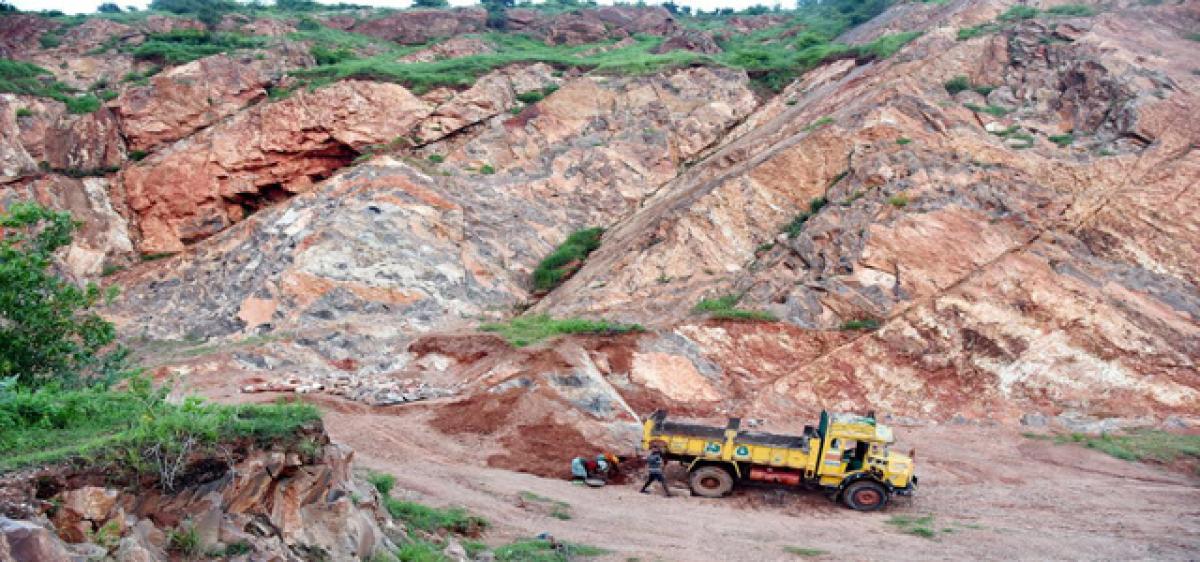Live
- Balija Bhavan to be constructed with modern amenities: MLA Arani
- Spl Abhishekam performed to Bedi Anjaneya Swamy
- Manchu Manoj alleges threat to life, rushes to Pahadishareef PS
- Cabbies continue to boycott airport trips
- 72nd death anniversary of Amarajeevi observed
- Mohan Babu calls on injured scribe in hospital, apologises
- Parents told to discipline boys to avert atrocities
- NTR Vaidya Seva services in Ramesh Hospitals soon
- Industrial pollution taking toll on lives of city dwellers
- Anantapur should be made second capital, demands Nagaraju
Just In

The beaches and hills, the pride of Visakhapatnam district, are facing the threat of a similar kind. While it\'s the sea that is eating into beaches, the hills are being eroded by indiscriminate quarrying and mining activities, either approved by the concerned authorities, or carried out in gross violation of norms.
Visakhapatnam: The beaches and hills, the pride of Visakhapatnam district, are facing the threat of a similar kind. While it's the sea that is eating into beaches, the hills are being eroded by indiscriminate quarrying and mining activities, either approved by the concerned authorities, or carried out in gross violation of norms.
“At least 10 hills have disappeared partially or completely in and around agency areas, including GK Veedhi, Anantagiri, Paderu, Hukumpeta, G Madugula, Muchumpet and Araku.
Mining activities is being carried out in around 130 acres. The private agencies undertaking mining activities claim they have NOCs from the Mandal Revenue Officer and permissions from Assistant Director of Mines and Geology, as well as the Collector.
However, there are hardly any public hearings conducted or Gram Sabha approvals sought,” said CPM district secretary K Lokanatham.
Former bureaucrat EAS Sarma, who wrote several letters to the Mines department citing irregularities and violation of norms by the lease holders, said AP has become a hub of rampant unauthorised mining, and only an investigation by an independent agency could bring the anomalies to fore. “There are majorly four types of violations taking place.
One, when the lessees exceed the limits of areas allotted to them; second, when non-tribals undertake mining in the shadow of benamis in schedules areas, listed in the Fifth Schedule of the Constitution, where only tribals are allowed to do mining; thirdly, there are private operators digging into the hills with no licenses; and a fourth kind in which the lessees have obtained permission to quarry laterite, but they mine the valuable bauxite too along with it, causing huge losses to the state exchequer,” Sarma said.
“The quarrying activity near Karakavalasa, rallavalasa and Nimmalapadu villages in Varasi Panchayat in Ananthagiri Mandal in Vizag Agency area, which is prima facie unauthorised covers an extent of 90 acres. The local Gram Sabha has apparently not been consulted as mandatorily required under PESA.
The person carrying out mining seems to have encroached on both government and private lands. There are several tribal cultivators, eligible for D-Pattas, affected by the mining activity,” reads a letter written by the former IAS officer to the authorities.
According to an officer from the Mines department in Anakappallli, there are about 320 quarries and mines scattered in 21 mandals in their jurisdiction. When tried to contact repeatedly, the Mines department in Vizag city remained unavailable for comments.
So, why do miners horde in numbers here? The east coast of the country is mineral-rich, and one-third of this wealth is located in the tribal areas of AP.
AP is the only state in southern India with coal deposits. About 20 percent of the country’s limestone reserves and 27 percent of bauxite reserves is in AP. The state is also abundant with Mica, Calcite, and gemstones.
The hills in the district are mainly dug up for metal quarries, laterite, colslate, bauxite, white marbles, white and blue granites and red soil.
While these products are priced high in the international markets, the royalties and other levies charged by the government ranges from one-sixth to one-tenth of the market prices, leading to miners scrambling to get leases by any means. Indiscriminate quarrying has several negative environment impacts.
Apart from loss to biodiversity, the loosening of the soil leads to erosion during rains. Most of these minerals are toxicants, that pollute water bodies, even underground water.
Also, when the forests, which are the carbon sinks, are removed, the carbon di oxide stagnates, leading to global warming,” said Prof. E Uday Bhaskar Reddy from Environment Studies department in Andhra University.
By: RUMANA UK

© 2024 Hyderabad Media House Limited/The Hans India. All rights reserved. Powered by hocalwire.com







